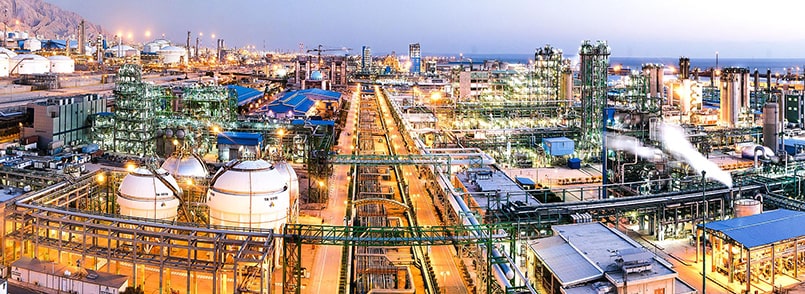Petrochemical Complexes
The petrochemical industry is part of the chemical industry that produces chemical products from raw materials derived from oil or natural gas.
Today, petroleum products, in addition to consumption in the field of vehicle fuel, engine oil, etc., have a valuable role in providing many parts needed to build vehicles. Petroleum products are used in the fueling of guided missiles, spacecraft and satellites, and even in the manufacture of many of their internal components. The raw material of most drugs and even antibiotics is derived from petroleum compounds.
Before oil entered the modern concept of human life, the required chemicals were obtained by changing and transforming the plant and animal industries. But in the early twentieth century, crude oil and natural gas, as the raw material for the production of many of the compounds needed by humans, became vital and increasingly important.

History
Ancient civilized peoples, especially the Sumerians, Assyrians, and Babylonians, were familiar with some of the oil found in Lake Qir about 4,500 years ago in the land of Mesopotamia (modern-day Iraq). They used bitumen itself as an impermeable material. The Romans and Greeks also used bituminous materials to make ship hulls impenetrable. It is also used for lighting and heating.
With the development of drilling technology in the mid-nineteenth century and the technology of oil distillation and refining in the late nineteenth century and its use in non-fuel cases, an astonishing leap occurred. So that today the petrochemical industry has a fundamental role in meeting the general needs of society.
Various petrochemical industries
Oil and its derivatives not only play a fundamental role in meeting human needs in the field of fuel, energy and fibers, but also led to the emergence and development of various important industries, some of which are mentioned.
- Simultaneously with the refining of crude oil, the use of internal combustion engines became widespread and millions of gasoline engines were introduced to the market.
- Today, petroleum products, in addition to consumption in the field of vehicle fuel, engine oil, etc., have a valuable role in providing many parts needed to build vehicles, and efforts are made to make the car body from plastic materials that polymerize them. Petroleum compounds can be obtained, manufactured.
- Petroleum products are used extensively in the propulsion of spacecraft and spacecraft guided missiles and even in the manufacture of many of their internal components.
- The raw material of most drugs and even antibiotics is derived from petroleum compounds. In particular, almost all detergents, bactericides, etc., are derived from petroleum and petrochemical products.
Crude oil compounds and petroleum products
Carbon and hydrogen atoms can surprisingly combine to form an extremely large number of aromatic chain and ring hydrocarbon compounds, so far a hydrocarbon with 60 carbon atoms in its molecular structure has been detected. . On the other hand, with increasing the number of carbon atoms, the number of hydrocarbon isomers also increases.
For example, a hydrocarbon with 30 carbon atoms can form more than four billion isomer hydrocarbons. In addition, due to the fact that in crude oil, saturated hydrocarbon compounds are also abundant, the number of compounds in it is extremely large and varied. This diversity is greatly enhanced by the presence of other atoms such as sulfur, nitrogen, and oxygen in hydrocarbon chains.
Major compounds in crude oil
The major constituents of crude oil are saturated saturated hydrocarbons with the general formula CnH2n + 2, cyclic saturated hydrocarbons with the general formula CnH2n, so-called naphthenes, and unsaturated chain hydrocarbons of ethylene and acetylene. The higher the percentage of oil components at low temperatures, the higher the quality. Natural gas is the gaseous part of petroleum products that is present with crude oil in underground reservoirs or is obtained by distilling crude oil below 200C. Natural gases are a natural mixture of methane (about 85%), propane, butane, carbon monoxide, and hydrogen (synthetic gas) with some soot.
Its main use is in non-industrial countries as a fuel. But in industrialized countries, it is used in the preparation of many chemical and industrial products, which are very useful and necessary.
Products of Iran Petrochemical Industries
The main products produced by Iran Petrochemical Industries are mainly:
Chemical fertilizers, urea, diamonium phosphate, ammonium nitrate mixed fertilizers, plastic raw materials, PVC and DOP, chemicals such as sulfuric acid, hydrochloric acid, ammonia, sulfur, soot, etc.
However, these products are very small compared to the tens of thousands of derivatives obtained from oil and natural gas with the help of advanced petrochemical technology, indicating that more efforts should be made in this field to get closer to reality.